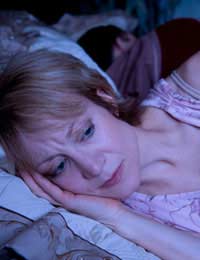Painful Intercourse During and After Menopause

Painful intercourse can occur during and after menopause, although each woman responds differently to the menopausal transition. For you, sexual intercourse may even become more enjoyable now that you no longer have to worry about birth control and pregnancy after menopause.
During the perimenopause phase, your hormone levels of oestrogen and progesterone begin to change, which leads to vaginal and sexual health changes as well. The walls of the vagina lose elasticity and strength while you may find you experience vaginal dryness and decreased lubrication during sex. In turn, the increased friction on drier tissues can mean that intercourse becomes uncomfortable or painful.
It's important to note, however, that while the experience of some discomfort or pain during sex could be normal for you during the menopausal transition, you should never find sex extremely painful. In this instance, you would need to see a doctor to ensure it is not another women's health condition that is causing the pain during intercourse.
What Causes Painful Sex?
There are many causes of painful sex and just because it occurs around the time of your menopausal transition, does not mean that it is automatically related. The pain you are experiencing could be due to an infection or a women's health problem with the cervix or uterus. It could also be a sexual health condition known as vaginismus, which is a very common women's health condition in which the woman experiences a spasm in her vaginal muscles. It primarily occurs from tension and fear of pain during intercourse. For menopausal women, just knowing that vaginal dryness occurs can leave women tense and fearful about potential pain during intercourse. Sexually transmitted diseases can also affect sexual health by causing pain during intercourse.Sometimes, it is even a case of a woman not being lubricated enough. If you are suffering from vaginal dryness due to menopause, you can try an over-the-counter vaginal lubricant. Some women also find that they benefit from using a vaginal lubricant not only prior to foreplay, but regularly each day during non-sexual activity. This way, lubrication is naturally and healthily maintained, which should make sex more comfortable and enjoyable for both you and your partner.
Is it Normal or Abnormal?
While how a woman experiences menopause can be uniquely individual, if you are suffering from significant pain during intercourse, you should immediately see your doctor. The pain could signify an underlying condition unrelated to menopause or it could represent something that is exacerbated by menopause. Some new pain during this time could be normal for you, which means that trying measures such as using a lubricant and ensuring you are relaxed during intercourse can be helpful.Menopause is a time of many physical changes and when these changes affect your relationships and sex life, it can be particularly distressing. There are, however, many ways to treat the vaginal changes that result from your changing oestrogen and progesterone levels. If the pain does become severe, speak to your doctor about other causes of pain during intercourse. With a few simple measures and a proactive approach to your gynaecological health, you can enjoy a fulfilling sex life in your relationships before, during and after menopause.
- Does Male Menopause Exist?
- Treating Infertility in Older Women
- What is Reproductive Competition?
- Menopause and Fertility: A Family Planning Quiz
- Menopause and Contraception
- Preventing Atrophic Vaginitis
- Sexual Health and You
- Communicating Better About the Menopause
- What to do About Decreased Libido
- Menopausal Challenges in Reaching Orgasm


Re: How Childbirth Affects Menopause Timing
I have give.live brithday to 10 children but have had a total of 13 prengacy, so my question is can this cause my…
Re: Positive Lifestyle Changes
i m giving councelling for menopause since few months in my gyn opd. this all info.was very imp and useful for me tnanks
Re: Why More Women Today Experience Early Menopause
Poppy - Your Question:Hi I am 42 female'. My periods have suddenly changed. For the past three months…
Re: Why More Women Today Experience Early Menopause
Hi I am 42 female'. My periods have suddenly changed. For the past three months instead of my regular 7…
Re: Soy Isoflavones & menopause
Bo jangles - Your Question:Can I take soy isoflavones along with Evorel 50 patches?I change my patch between every 2-3 days…
Re: Soy Isoflavones & menopause
Can I take soy isoflavones along with Evorel 50 patches? I change my patch between every 2-3 days because it dries out so…
Re: HRT and Migraines
I stopped taking the combined hrt tablet 2 weeks ago on my docs advice. I had been on it for 5 years. I'm 56 years old. Other than a few warm…
Re: HRT and Migraines
i get very up set alot. am stillhaving bad pain. and get very moody as well
Re: Do Your Genes Mean Early Menopause?
i have been having perimenopausal symptoms for a decade with low calcium and osteoarthritis before 40. now am taking…
Re: Treating Hot Flushes with Blood Pressure Drugs
Debbie - Your Question:Hi I had breast cancer grade 3 stage 3 five years ago and had my ovaries taken out…